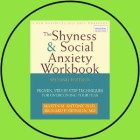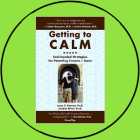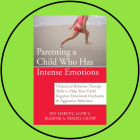Tag Archives:book review
Shyness and Social Anxiety Workbook: Proven, Step-by-Step Techniques for Overcoming your Fear by Martin M. Antony PhD and Richard Swinson MD FRCPC FRCP share
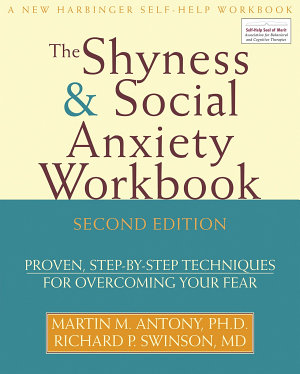 I recommend using this book when working with adults and some teens who have high levels of shyness and social anxiety. In a clear, and easy to read fashion, this book takes you step-by-step through the process of learning about how cognitive behavioral therapy (CBT) views shyness and social anxiety and is a powerful tool in overcoming how these thoughts and feelings can hold you back from living your life in a way that you are comfortable and happy with. CBT is a therapeutic philosophy and a large body of scientific research strongly supports CBT as the foremost treatment of social anxiety.
I recommend using this book when working with adults and some teens who have high levels of shyness and social anxiety. In a clear, and easy to read fashion, this book takes you step-by-step through the process of learning about how cognitive behavioral therapy (CBT) views shyness and social anxiety and is a powerful tool in overcoming how these thoughts and feelings can hold you back from living your life in a way that you are comfortable and happy with. CBT is a therapeutic philosophy and a large body of scientific research strongly supports CBT as the foremost treatment of social anxiety.
I do think that most people would still need a therapist to be guiding them through the process because for the individual working to learn these skills and challenging themselves to try new things, it can take a lot of energy. When a therapist is coaching you in the sidelines (and celebrating your successes with you), it frees you up to devote all of your energy towards growing. However, over time, these are skills that you will learn and can take with you forever. Once you understand how it works and how powerful it is, you will be able to use this approach to tackle any similar issues that should come up for you in the future.
As a therapist, I don’t use this book alone. I supplement it with concrete, scientifically grounded information about relaxation breathing, Growth Mindset as well as other customized handouts and tally sheets for homework.
Getting to Calm: Cool-Headed Strategies for Parenting Tweens + Teens by Laura S. Kastner PhD & Jennifer Wyatt, PhD share
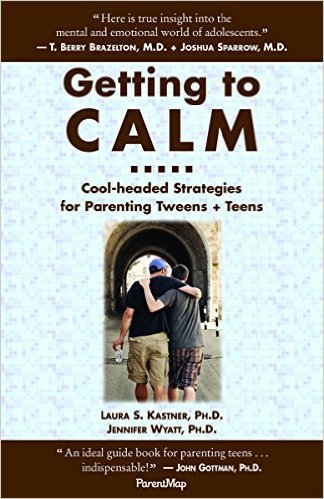 I intend to get around to reading this myself. My “to read” book pile is quite high at the moment. So many wonderful ideas, so little time! However, on surface glance, it appears that it would be a quality resource to recommend to parents who are in the throws of struggling with their excessively moody teen.
I intend to get around to reading this myself. My “to read” book pile is quite high at the moment. So many wonderful ideas, so little time! However, on surface glance, it appears that it would be a quality resource to recommend to parents who are in the throws of struggling with their excessively moody teen.
I am a fan of Dr. Kasner’s, after seeing her speak in a YouTube video, that I highly recommend. She does a wonderful job of weaving what science now tells us about the teen brain into a cohesive approach to parenting teens.
Parenting a Child Who Has Intense Emotions: Dialectical Behavior Therapy Skills to Help Your Child Regulate Emotional Outbursts and Aggressive Behaviors by Pat Harvey, ACSW, LCSW-C share
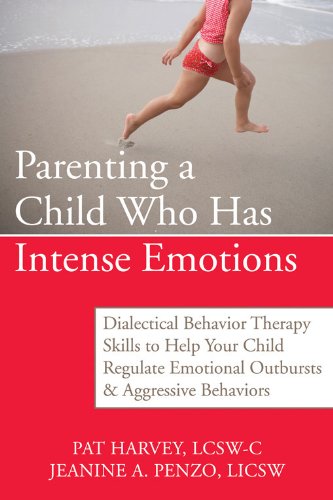 A truly insightful book that helps parents to step out of the power struggles that we adults can so easily find ourselves in with children and teens who experience emotions in a big way. Kids who seem to blow-up over nothing, struggle with transitions, seem to be constantly challenging adult authority, or be intent on badgering you into submission for whatever they want are actually really struggling. They don’t like feeling out of control like this but don’t yet have the skills they need to calm themselves down, to soothe themselves, and to handle things in a calmer manner.
A truly insightful book that helps parents to step out of the power struggles that we adults can so easily find ourselves in with children and teens who experience emotions in a big way. Kids who seem to blow-up over nothing, struggle with transitions, seem to be constantly challenging adult authority, or be intent on badgering you into submission for whatever they want are actually really struggling. They don’t like feeling out of control like this but don’t yet have the skills they need to calm themselves down, to soothe themselves, and to handle things in a calmer manner.
Often our first impulse as parent is to come down harder on these kids, grappling with the feeling that we have lost control of a situation that we “should” be in control of and trying to re-establish a sense authority. We put a great deal of pressure on ourselves to fix the problem and this stress makes us even more likely to lose our temper. We find ourselves reacting in ways that we never would have imagined back in the days when having a child was a dream and not yet reality. We wonder, “How have I come to be a person who yells, physically intimidates, or even possibly gets into physical altercations with my kid?” We think, “I have punished them with every consequence I can think of and nothing works!” We worry, “How is all of this conflict affecting our other children?” and “What will become of my child if we don’t get this turned around?”
The reality is that these kids respond VERY poorly to attempts to dominate them and punish them into compliance and it only serves to escalate the arguments and tension in the household while, at the same time, make them feel worse about themselves. Secondary problems can crop up like depression and suicidal thoughts.
What else is there to do? Based firmly in scientific research, this book helps parents understand the emotional struggles that kids like this are grappling with and how miserable they really feel when their emotions are out of control. It helps you find ways to show your child or teen that you love them, understand that they are struggling, and gradually teach them coping strategies that can help them to regulate their emotions. Additionally, it helps parents to set limits and expectations that are realistic and even therapeutic. If you have been reading this review and have been brought to tears by how much this describes your life with your child, I truly can’t recommend this book enough.
I would also like to add a message of hope. Kids and adults who tend to experience their emotions very intensely also have many strengths and can “use their powers for good.” These are folks who are passionate and tenacious. They are artistic. They feel the pain of other’s deeply and care about making positive changes in the world. When they learn to harness their feelings constructively and focus their energies on projects that interest them, the things that they are capable of is incredible! Looking through the “lens” of the medical model, labels/diagnoses that are often connected to these types of kids are: ADHD, ODD, Asperger’s, Bi-Polar Disorder, and Borderline Personality Disorder. I caution you to only lean on labels like this for what they can do for you. Often labels like this cause harm because some people take it to mean that something is “wrong” with them; that they are “broken.” I don’t think this is a helpful or healthy perspective. You can read more of my thoughts on this here.
So, if you are struggling with a child who has intense emotions, get this book. Also, I urge you to strongly consider finding a therapist (or two) who has experience working with children/teens AND who has experience using the theoretical framework this book is based on, DBT (Dialectical Behavior Therapy). This is a tough road to go alone for both the child and the parent. If you are at your wit’s end, it can also help a great deal for you (together with other parental figures in the home) to have your own therapist to guide you though the process, helping to shift your approach with your child to one that teaches emotion regulation instead of constantly doing battle with them. Ideally, signing release forms so the two therapists can coordinate the work they do with your family will help the process to be as effective and efficient as possible.
PS – You may also want to check out this video, Teen extremes: Regulating Moods in the Age of Anxiety, as it based on the DBT concepts described in the book and presented by Dr. Marsha Linehan, the actual psychologist who developed DBT.

